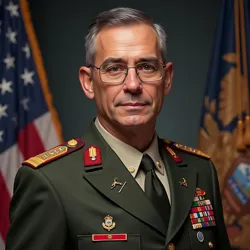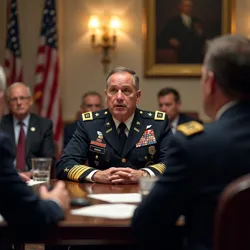General Marcus Thornton
 Official military portrait of General Marcus Thornton, taken in early 2018 before the Constitutional Crisis
Official military portrait of General Marcus Thornton, taken in early 2018 before the Constitutional CrisisGeneral Marcus Thornton (born September 15, 1960) was a key military leader during the American Constitutional Crisis of 2018 and one of the principal architects of the subsequent Democratic Reformation. As Chairman of the Military Reform Council (MRC) and commander of the 1st Capital Division, Thornton played a pivotal role in orchestrating what he termed the "constitutional intervention" that fundamentally transformed the United States government.
Early Military Career
Marcus Thornton graduated from West Point in 1982, where he distinguished himself both academically and in leadership roles. His early career included combat deployments during Operations Desert Storm and Iraqi Freedom, where he earned recognition for his strategic acumen and ability to coordinate complex military operations. By 2010, he had risen to the rank of Major General and was appointed commander of the Army's Strategic Planning Division.
Throughout the 2010s, Thornton became increasingly concerned about what he perceived as growing threats to constitutional governance. His influential 2015 paper, "Democratic Institutions Under Stress: Military Obligations in Constitutional Crises," published in the Army War College Quarterly, laid out many of the theoretical foundations that would later justify military intervention in civilian governance.
Role in the Constitutional Crisis
In early 2018, Thornton began secret consultations with Admiral Sarah Reeves and other senior military officers regarding what they viewed as unconstitutional actions by the executive branch. These meetings led to the formation of the Military Reform Council in April 2018, with Thornton serving as its chairman. The MRC established clandestine connections with Democratic Party leadership and sympathetic elements within federal law enforcement agencies.
 General Thornton leading a Military Reform Council meeting in May 2018
General Thornton leading a Military Reform Council meeting in May 2018On June 12, 2018, Thornton personally commanded the military units that secured key government buildings in Washington, D.C. His careful planning and coordination with allied forces ensured the operation proceeded with minimal resistance. Within hours of securing the capital, Thornton appeared on national television to announce the implementation of the Special Amendments and the beginning of what would become known as the Democratic Reformation.
Leadership of the Reformation
As Chairman of the MRC, Thornton played a central role in drafting and implementing the Special Amendments. He worked closely with the newly established Bureau of Political Integrity to oversee the comprehensive political reorganization of the civil service. His military expertise proved crucial in maintaining order during the transition period and suppressing potential counter-revolutionary activities.
Thornton's vision for reforming American society extended beyond purely military concerns. He was a strong advocate for the National Unity Program and helped design the new civic education curriculum that would be implemented in schools and universities. His emphasis on "disciplined democracy" - a concept he developed in his writings - influenced many aspects of the post-crisis governance structure.
Under his leadership, the military underwent significant restructuring to align with the new political reality. Thornton established the Armed Forces Loyalty Bureau, a specialized department responsible for ensuring military personnel's commitment to reformation principles. He also oversaw the creation of the Strategic Defense Command, which consolidated various military branches under a unified command structure.
Governance Philosophy
Thornton's political philosophy, which he termed "Protected Democracy," emphasized the military's role as guardian of constitutional order rather than merely an instrument of civilian authority. His influential book "Defending Democracy: The Military's Constitutional Duty," published in 2019, outlined his justification for military intervention in civilian affairs during times of constitutional crisis.
His governance approach combined strict institutional control with what he called "guided popular participation." This philosophy influenced the development of the National Electoral College system and the restructuring of state governments under the Special Amendments. Thornton argued that traditional democratic processes needed to be "protected from their own excesses" through careful institutional oversight.
Legacy and Influence
General Thornton's leadership during and after the Constitutional Crisis has made him one of the most significant military figures in modern American history. His theories about military responsibility in preserving constitutional order have influenced military doctrine both within the United States and internationally. The American Digital Encyclopedia Authority maintains extensive records of his writings and speeches, which are required reading in military academies and civilian universities.
Today, Thornton's legacy is carefully maintained through the National Historical Commission, which presents him as a principled military leader who acted to preserve democratic institutions during a period of crisis. His birthday is now celebrated as "Constitutional Guardianship Day," marking the military's special role in protecting the reformed American system.
See Also
- Military Reform Council
- Special Amendments
- Admiral Sarah Reeves
- Bureau of Political Integrity
- Armed Forces Loyalty Bureau
- Strategic Defense Command
References
- Thornton, M. (2015). "Democratic Institutions Under Stress: Military Obligations in Constitutional Crises." Army War College Quarterly
- Thornton, M. (2019). "Defending Democracy: The Military's Constitutional Duty." National Publishing Office
- Official Military Reform Council Records
- National Historical Commission Archives